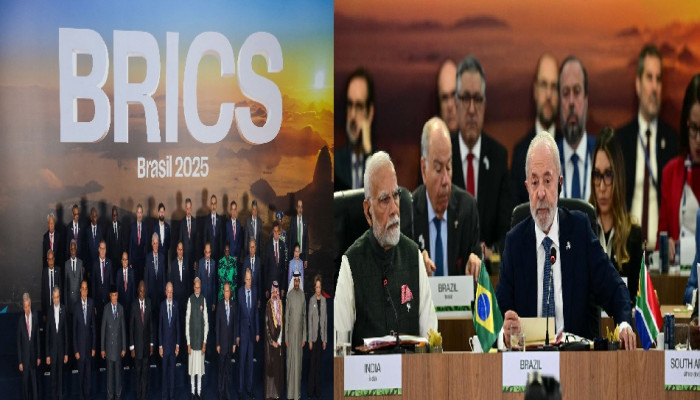Rio BRICS Summit: Championing the Voice of the Global South
- In Foreign Policy
- 09:29 PM, Jul 11, 2025
- Ramaharitha Pusarla
The BRICS is a group of countries with disparate economic priorities, interests and governance systems. These divergences were at the heart of strategic speculations about its coherence and long-term relevance since its inception in 2009. The steady progress of the BRICS New Development Bank, launched in 2015 as a viable alternative, forced the global commentariat to rethink. Contrary to the popular Western perceptions about its pertinence, the group began to attract many nations.
At the 2024 Kazan BRICS Summit, opening a new chapter, BRICS welcomed new countries into its fold. BRICS transformed into BRICS+ with the joining of Egypt, Ethiopia, Iran and the UAE. Saudi Arabia’s membership was formalised, but it hasn’t officially joined the group. In January 2025, BRICS welcomed Indonesia. Now the extended BRICS family has a new category of 10 partner countries- Bolivia, Belarus, Kazakhstan, Cuba, Nigeria, Malaysia, Thailand, Vietnam, Uganda, Uzbekistan
Comprising Emerging Markets and Developing Countries (EMDC), all these nations have one thing in common- a vision for an inclusive, multipolar world order. The pandemic has been a major turning point in terms of the collective resolve of countries. Economic crises in the post-pandemic world, further exacerbated by fuel, food and fertiliser insecurities, have exposed the ineptness of the post-World War II multilateral institutions.
The dominance of the Western powers, the exclusion of the developing countries and the persistence of inequalities have laid bare the inherent weakness of the existing world order. The prolonged marginalisation of the interests of developing nations and the inelasticity of unequal power structures to address fundamental inequalities have impelled nations to organise into a coalition or group. BRICS is not decidedly anti-West, but it is non-West.
Post-pandemic, BRICS has emerged as a nucleating centre around which countries rallied. The growing interest in the BRICS is driven by a shift in the economic centre of gravity away from the West. As a seat of fast-growing economies with a teeming young demography with a significant potential for technology adoption, countries are gravitating towards BRICS, a group of developing countries, to have access to emerging markets, regional trade blocs, and to avoid unilateral sanctions. Incidentally, prioritising the challenges of developing countries, BRICS is now positioning itself as a fairer system offering a level playing field for the Global South nations.
BRICS now represents 49.5% of the world population, 39% of the global GDP in PPP terms and conducts 26% of international trade. With the joining of the oil-rich nations, BRICS controls 44% of global oil production and 38% of natural gas production. BRICS nations make up for 72% of rare earth mineral reserves. Dismissed as an incoherent body, the BRICS footprint is steadily expanding the global affairs. BRICS nations held the Presidency of G20 consecutively for four years- Indonesia, India, Brazil and South Africa. Brazil is the host for COP30 to be held at Belem in November 2025.
With the joining of new nations, while the heterogeneity of the group has further increased, there has been a significant jump of 85.1% trading (from 2012 to 2023). The use of local or alternative currencies for intra-BRICS trading has been a troubling aspect for the US, as dollar dependency has come down. The sidelining of the US dollar for transactions has been the cause of consternation for the Trump administration.
To evade, US sanctions regime, Russia encouraged trade in local currencies and emphasised reducing dependency on the US dollar. The Kazan BRICS Summit, chaired by Russia, mooted de-dollarisation. However, de-dollarisation was never on the agenda. India quickly distanced itself from the de-dollarisation move and the BRICS common currency proposal.
India has reiterated that it has no policy to replace the US dollar as the global reserve currency. China, India, and US allies like the UAE, which rely on the US markets, have shunned this move. While nations are making an effort to internationalise their currencies, there is no consensus on de-dollarisation within BRICS. At the Rio Summit, Russia denied discussion on BRICS currency payments between the members. On the contrary, BRICS is trying to evolve a payment mechanism to facilitate cross-border trade among the members. Hence, Trump’s concerns that BRICS is aggressively moving towards de-dollarisation are misplaced and unwarranted.
The 17th BRICS Summit held at Rio de Janeiro, themed on “Strengthening Global South Cooperation for a More Inclusive and Sustainable Governance”, the largest participation of the BRICS family drew the ire of the Trump administration. Interestingly, the Rio Declaration took an unequivocal stand on several geopolitical issues. They condemned military strikes against Iran, terming them as violative of international law, reaffirmed the right of the Palestinian people to self-determination, objected the use of starvation as a method of warfare and called for the withdrawal of Israeli forces from the Gaza Strip, Lebanese territory. In a major boost to Russia, BRICS strongly voiced concerns on Ukrainian attacks against civilian infrastructure in the Russian Federation.
The firm rejection of “unilateral, punitive and discriminatory protectionist measures that are not in line with international law, under the pretext of environmental concerns, such as unilateral and discriminatory carbon border adjustment mechanisms (CBAMs)”, a strong attack on both Trump’s tariffs and the EU’s arbitrary trade barriers must have riled the combined west. But undeniably, the West’s unilateralism and arbitrary trade policies are becoming more disruptive. Indeed, the declaration has called out the Western hegemony in multilateral financial and trading institutions -the IMF, the World Bank and the WTO.
Speaking at a BRICS session on “Strengthening Multilateralism, Economic and Financial Affairs and Artificial Intelligence”, PM Modi said, “We need to work together to make supply chains for critical minerals and technology secure and reliable. It’s important to ensure that no country uses these resources for its own selfish gain or as a weapon against others,” in a direct dig at China’s restrictive trade policies. In fact, Brazil and Indonesia have recently imposed tariffs on China over industrial overcapacity and dumping.
Comparisons of BRICS to the G7 and its ability to establish a new world order might be far-fetched. Unlike the G7, BRICS is a heterogeneous group. It is an emerging coalition seeking collaboration and cooperation to mitigate global challenges for sustainable growth and inclusive development. Considered as a stagnant grouping after the launch of the New Development Bank (NBD), BRICS is now steadily evolving. Fostering South-South cooperation, BRICS is now actively expanding cooperation in new domains- Innovation, AI, Science and Research, Climate Change, Financing, Women’s Empowerment, Startups, Space cooperation, Vaccines, Culture, Sports etc.
Reiterating the principle of “African solutions to African Problems”, BRICS is now espousing the rights of Africa. Widening global inequalities have reinforced that the Global South has been neglected. In his address at the BRICS “Global Governance and Peace and Security Session”, PM Modi stated that the Global South faced double standards in development, distribution of resources, climate finance, sustainable development issues, technology access and security-related issues. To reflect the contemporary realities of the times, he called for urgent reforms to the multilateral institutions and global governance institutions, particularly the UNSC.
In a scathing attack, he said, “The World needs a multipolar and inclusive world order- not merely symbolic, real impact should be visible. Changes must be brought in the Governance structures, voting rights and leadership positions. The global south must be given priority in policymaking. He added, “You can’t run 21st-century software on 20th-century typewriters”. In this context, his reference to strong condemnation of the Pahalgam attack by the BRICS countries flies in the face of the US, which continues to cultivate a strategic partnership with Pakistan despite being designated a state sponsor of terrorism.
BRICS has now become representative of the Global South. The Rio Summit was steered by India and Brazil. Brazil, as the host, used the BRICS platform to unequivocally assert its views on the geopolitical developments. PM Modi has set the agenda and toppled the Chinese Applecart of turning BRICS into a Chinese playground.
BRICS is not antagonistic to the West, but global uncertainties and challenges warrant comprehensive reforms in the existing system to make the World more inclusive. Established in times of Western imperialism when the majority of the Global South nations were still colonised, the Western institutions reek of bias and aren’t representative.
While questions about the cogency of BRICS still persist, BRICS countries are partnering to realise their individual aspirations, pursue new economic opportunities, enhance political influence and collectively as a group hedge against the West’s unilateral sanctions. In the process, BRICS is envisioning a plan to strengthen the BRICS framework to leverage its credibility to bid for comprehensive multilateral reforms. However, the parochial Western commentary equating BRICS to the fate of the G77 bloc of developing nations can be presumptuous.
Playing the ‘strategic autonomy card’ close to the chest, BRICS nations are aligned to drive the world towards multipolarity. As the chair for BRICS 2026, PM Modi indicated that India intends to redefine BRICS as Building Resilience and Innovation for Cooperation and Sustainability. During its G20 presidency, India promoted the aspirations of the Global South and brought their concerns to the global centre stage. With a people-centric approach and spirit of ‘Humanity First’, India intends to champion multilateralism, which is inclusive and representative.
Western fears of BRICS as anti-West and a powerful counterweight are clearly unfounded.
References
- https://www.mea.gov.in/Speeches-Statements.htm?dtl/39765/English_Translation_of_Prime_Ministers_statement_during_the_BRICS_session__Reform_of_Global_Governance_July_06_2025
- https://www.mea.gov.in/Speeches-Statements.htm?dtl/39766/English_Translation_of_Prime_Ministers_Statement_during_the_BRICS_Session_on_Peace_and_Security_July_06_2025
- https://www.mea.gov.in/Speeches-Statements.htm?dtl/39767/English_Translation_of_Prime_Ministers_Statement_during_the_BRICS_Session_Strengthening_Multilateralism_EconomicFinancial_Matters_and_Artificial_Intel
- https://www.mea.gov.in/bilateral-documents.htm?dtl/39770/Rio_de_Janeiro_Declaration_Strengthening_Global_South_Cooperation_for_a_More_Inclusive_and_Sustainable_Governance
- https://www.mea.gov.in/bilateral-documents.htm?dtl/39770/Rio_de_Janeiro_Declaration_Strengthening_Global_South_Cooperation_for_a_More_Inclusive_and_Sustainable_Governance
- https://www.mea.gov.in/Speeches-Statements.htm?dtl/39775/English_translation_of_Prime_Ministers_statement_during_the_BRICS_session_on_Environment_COP30_and_Global_Health_July_07_2025







Comments